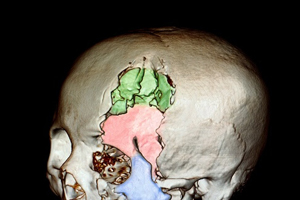Accidents



No matter what type of accident you are in, a traumatic brain injury can completely upend your life. Not only are treatments for brain injuries costly, but the kind of brain injury you sustained could impact your ability to work, as well as your day-to-day life and activities.

If you have been in an accident and have sustained a brain injury, your medical team will explain the type of injury you have, what treatment looks like, and what you can expect in terms of recovery. If you believe someone else’s negligence contributed to your accident, you may have grounds for a personal injury claim. That’s where a Florida brain injury attorney from Hoskins Turco Lloyd & Lloyd can help.
Traumatic brain injuries (TBI) occur when an external force suddenly and physically damages the brain. TBI is a broad term that applies to a number of different injuries — some of which we will discuss in-depth below.
TBIs may be closed or open. A closed brain injury occurs inside the brain with no noticeable trauma. With an open brain injury, the skull is punctured and the skull or brain may be exposed. While both have serious consequences, the latter tends to be more fatal. Brain injuries can also be confined to one area of the brain or affect multiple portions of the brain.
The signs and symptoms of a traumatic brain injury vary significantly depending on the extent of the damage. While some minor injuries may require rest and anti-inflammatory medication, severe injuries may require surgery and result in life-long disabilities.
While there are numerous classifications of TBIs, certain injuries are more common than others. If you have been diagnosed with a traumatic brain injury, it is likely one of the following four:
A brain contusion is essentially a bruise on the surface of the brain. Often occurring alongside concussions, contusions are common in car accidents where a person’s head is quickly accelerated forward and decelerated to its original position. The sudden forces can cause trauma even when the injury victim doesn’t suffer a direct blow to the head.
While some brain contusions can stop bleeding on their own, surgical intervention may be necessary if the bleeding does not stop. The severity of a bruise and the related consequences depend on the size of the bleed, how long the bleeding lasts, and the location of the injury. Given its complexity, surgery can also have an impact on recovery.
Concussions are the most common type of TBI. They occur when a force causes the brain to shift inside the skull. Often caused by blows or strikes to the head, a concussion may be mild, moderate, or severe. The most common symptoms include headaches, balance problems, light sensitivity, confusion, nausea, and vomiting.
Individuals who suffer multiple concussions — either over time or in quick succession — are at risk of developing a condition known as chronic traumatic encephalopathy. This is particularly common among professional athletes like football players. Chronic traumatic encephalopathy causes permanent changes to behavior, mood, and overall brain function.
A coup-contrecoup brain injury is similar to a concussion and contusion, except the consequences are often much more severe. This type of TBI occurs when a significant force causes a person’s skull to slam into the opposite side of the initial impact side. As a result, the brain sustains damage to both sides. Acts of violence, serious car accidents, and falls are among the most common causes.
In many instances, coup-contrecoup brain injuries are fatal. In the event an accident victim survives, extensive medical intervention is typically needed. Even with surgeries and procedures and rehabilitation, the victim will likely sustain permanent effects. A person’s age and brain health can also impact their prognosis.
A diffuse axonal injury results from the head moving so violently that the brain stem cannot keep up with the movement. As a result, tears develop in the connections to the brain. Even microscopic tears can cause brain damage. Large tears are often fatal.
When someone sustains a diffuse axonal injury, it is likely they will also receive other traumatic brain injuries. Recovery and symptoms depend on factors like the severity of the tears, the different injuries incurred, and a person’s general health prior to their accident.
As discussed, the traumatic brain injuries above are the most common after accidents. However, there are other brain injuries you should be aware of, including:
If you or someone you love has been harmed and is now suffering from the consequences of a traumatic brain injury, the brain injury attorneys from Hoskins Turco Lloyd & Lloyd can help.
When you reach out to us for a free consultation, we will review your accident and injuries, evaluate your options, and explain your rights. If you choose to proceed with a personal injury claim, we will guide you through the process and fight on your behalf to help you recover the compensation you need to manage your injury and all related expenses.
Call 866-460-1990 or contact us online today to schedule a free in-person or virtual case evaluation with a Florida brain injury lawyer near you.
Get an estimate for the value of your injuries
"*" indicates required fields
Complete our confidential evaluation form to have your case reviewed for free by our attorneys and staff.
An attorney or intake specialist will contact you directly to discuss your case at no cost to you.
From the moment you hire us, we will stand behind you, fighting to get the results you deserve.
Get the answers you need. We’ll review your case today, for free.
"*" indicates required fields